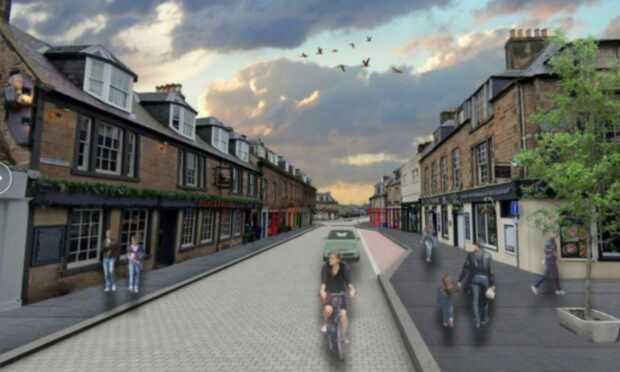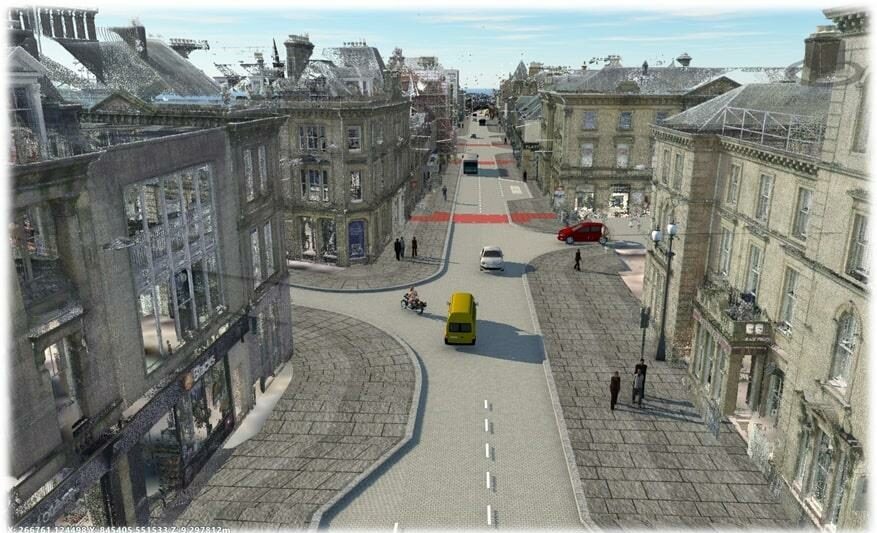Inverness councillors will be asked to back plans to ban private cars from Academy Street at a meeting this week.
Highland Council planners have drafted two options for the future of one of the city’s main thoroughfares.
And the option preferred by the planners will see private vehicles banned from Academy Street for good.
The Inverness city committee will meet on Thursday to decide the next step.
A consultation on the city centre’s most popular route began back in May.
Why is Academy Street changing?
The Scottish Government has committed 10% of its annual transport budget to active travel by 2024-25.
That figure will be around £320m.
There are currently around 8,500 to 9,500 cars, vans, lorries and buses on Academy Street every day.
Analysis of the traffic has shown that 50% of these vehicles are using the street as a through route – rising to 75% in the morning rush hour.
According to the council, those numbers mean Academy Street would not eligible for the funding needed to improve it.
That’s unless alternative cycle routes are identified or measures are put in place to reduce the volume of traffic.
In a report that will be considered by councillors on Thursday, active travel project officer Brendan Dougan said: “Inverness finds itself at a pivotal moment.
“Significant efforts are under way to transform the city centre into a vibrant, successful place where people and business can enjoy a revival.
“Crucial to this change is how urban design and transport modes affect – positively or negatively – the quality, safety and enjoyment of our streets.”
What are the two options?
In the papers for Thursday’s committee meeting, planners have narrowed the choices down to two: option A and option B.
The pavements will widen, you can take that as read. Because that measure is in both.
The space for pedestrians will widen to where the black-and-white bollards on the street currently are.
In other words, those temporarily wide pavements brought in during the pandemic will become permanent.
Both options also include increasing the number of crossing points.
Where they differ is in their plans for private cars.
In option A, two-way traffic is maintained for all vehicles.
However, the planning report states that this option means it is “highly unlikely” the city will benefit from Places for Everyone cash.
It will also severely limit the opportunities for other external funding.
That appears to be why planners are recommending that councillors back option B.
In this option, access for vehicles is restricted to deliveries, public transport and blue-badge holders.
Whatever happens, big changes are on the way for Academy Street.
What happens next?
Planners have recommended that members of the Inverness city committee agree that option B is the best way forward.
If that happens, officers will put together an application to the Scottish Government for funding and the wheels will be in motion.
But don’t be surprised if it’s not as straightforward as that.
Temporary measures brought in during the Covid pandemic provoked some fiery exchanges when it came time to decide whether or not to keep them.
The issue divided public opinion almost as much as it divided the roads.
A one-way system along Castle Street was decisively binned by the city committee in August 2021.
The one-way system along Riverside Way remained, but only after a close 10-9 vote in its favour.
The public consultation carried out for the Academy Street work appears to have more public support.
Feedback from the online portal set up for it showed that 68% of 521 responses viewed the plans favourably.
We may see a similar result in the chamber on Thursday.
However, given this issue’s history, there could be some fireworks.




Conversation